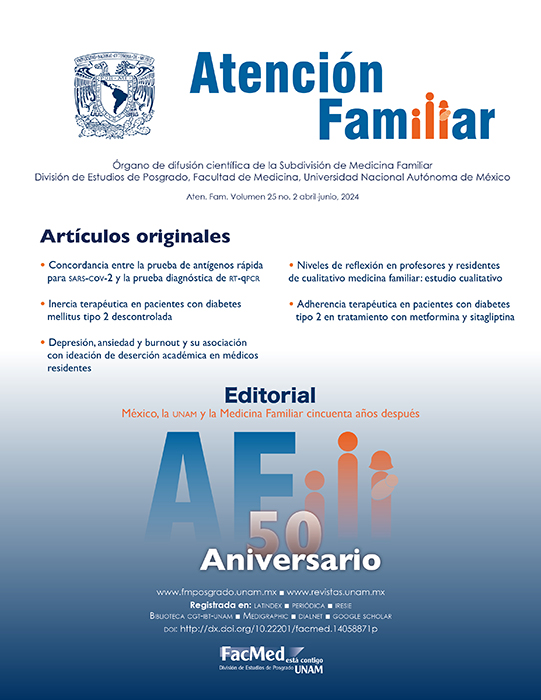Levels of Reflection in Teachers and Family Medicine Residents: A Qualitative Study
Contenido principal del artículo
Resumen
Objetivo: analizar los niveles de reflexión de acuerdo con el modelo de Mezirow en un grupo de profesores y residentes de la especialidad de Medicina Familiar de la República Mexicana. Métodos: estudio cualitativo, se utilizó una cédula en formato Word para recabar datos sociodemográficos, así como incidentes críticos relacionados con problemas de comunicación profesor-alumno, a partir de dichos incidentes se analizó el nivel de reflexión de los participantes. Resultados: se clasificaron 192 eventos relacionados con incidentes críticos y, a partir de ellos, se realizó un análisis para determinar el nivel de reflexión de los participantes. 104 (81.88%) eventos descritos por profesores y 45 (69.23%) por residentes, fueron ubicados en el primer nivel de análisis que correspondió a no reflexivos, 21 (16.53%) de profesores y 18 (27.69%) de residentes se situaron en el segundo nivel: reflexivos, mientras que 2 (1.57%) de profesores y 2 (3.07%) de residentes se clasificaron como reflexivos críticos. Conclusión: de acuerdo con el modelo de Mezirow, el nivel de reflexión, en la mayoría de los participantes, no propició cambios que favorecieran modificación de conductas. Estos hallazgos sugieren la necesidad de estrategias adicionales para fomentar la reflexión crítica y facilitar cambios actitudinales en el contexto educativo.
Descargas
Detalles del artículo
Citas en Dimensions Service
Citas
Bhardwaj A. Medical Professionalism in the Provision of Clinical Care in Healthcare Organizations. JHL. 2022;14:183–9.
Forouzadeh M, Kiani M, Bazmi S. Professionalism and its role in the formation of medical professional identity. Med J Islam Repub Iran. 2018;765–768.
Reed DA, Mueller PS, Hafferty FW, Brennan MD. Contemporary issues in medical professionalism challenges and opportunities. Minn Med. 2013;96(11):44–7.
Escorcia-Reyes JR, López-Ortiz G. Altruismo, empatía y profesionalismo médico. Med Int Méx. 2021;37(6):1069-1074.
Gathu C. Facilitators and Barriers of Reflective Learning in Postgraduate Medical Education: A Narrative Review. Journal of Medical Education and Curricular Development. 2022;9:238212052210961.
Schei E, Fuks A, Boudreau JD. Reflection in medical education: intellectual humility, discovery, and know-how. Med Health Care and Philos. 2019;22(2):167–178.
Ní Mhurchú M, Cantillon P. Reflective practice in medicine: The hidden curriculum challenge. The Clinical Teacher. 2023;e13682.
Hernández-Torres I, Pons-Álvarez ON, López-Ortiz G. Importancia de la comunicación profesor-alumno en medicina: un abordaje necesario. Med Int Méx. 2023;39(4):675-680.
López-Ortiz G. Comunicación con el paciente: una acción necesaria en la medicina familiar. Atención Familiar. 2022;30(1):1–2.
Mezirow J. Transformative Dimensions of Adult Learning. San Francisco: Jossey-Bass; 1991.
Machost H, Stains M. Reflective Practices in Education: A Primer for Practitioners. CBE Life Sci Educ. 2023;22(2):es2.
Schön DA. The Reflective Practitioner. Routledge; 2017.
Montgomery A, Doulougeri K, Panagopoulou E. Do critical incidents lead to critical reflection among medical students? Health Psychology and Behavioral Medicine. 2021;9(1):206–219.
Chirico A, Pizzolante M, Kitson A, Gianotti E, Riecke BE, Gaggioli A. Defining Transformative Experiences: A Conceptual Analysis. Front Psychol. 2022;13:790300.
Vipler B, Snyder B, McCall-Hosenfeld J, Haidet P, Peyrot M, Stuckey H. Transformative learning of medical trainees during the COVID-19 pandemic: A mixed methods study. PLoS ONE. 2022;17(9):e0274683.
Froneman K, Du Plessis E, Van Graan AC. A concept analysis of facilitating presence through guided reflection for transformative learning in nursing education. Nursing Open. 2023;10(5):2920–2933.
Choi H, Jang S. Mediating effect of reflection types: feedback on reflection-for-action and student perception of patient-centredness. Medical Education Online. 2022;27(1):2127166.
Schaepkens SPC, Veen M, De La Croix A. Is reflection like soap? a critical narrative umbrella review of approaches to reflection in medical education research. Adv in Health Sci Educ. 2022;27(2):537–51.
The World Medical Association-Declaración de Helsinki de la AMM – Principios éticos para las investigaciones médicas en seres humanos [Internet]. [citado 13 de noviembre de 2023]. Disponible en: https://www.wma.net/es/policies-post/declaracion-de-helsinki-de-la-amm-principios-eticos-para-las-investigaciones-medicas-en-seres-humanos/
Reglamento de la Ley General de Salud en Materia de Investigacion para la Salud [Internet]. [citado 13 de noviembre de 2023]. Disponible en: https://www.diputados.gob.mx/LeyesBiblio/regley/Reg_LGS_MIS.pdf
Vipler B, Knehans A, Rausa D, Haidet P, McCall-Hosenfeld J. Transformative Learning in Graduate Medical Education: A Scoping Review. Journal of Graduate Medical Education. 2021;13(6):801–814.
Taylor EW. An update of transformative learning theory: a critical review of the empirical research (1999–2005). International Journal of Lifelong Education. 2007;26(2):173–191.
Van Schalkwyk SC, Hafler J, Brewer TF, Maley MA, Margolis C, McNamee L, et al. Transformative learning as pedagogy for the health professions: a scoping review. Medical Education. 2019;53(6):547–558.
Vipler B, Green M, McCall-Hosenfeld J, Haidet P, Tisdell E. A Graphic Transformation: A Qualitative Study of Transformative Learning in Medical Trainees during COVID-19 Using Comics as Data Presentation. Teaching and Learning in Medicine. 2023;35(3):287-302.

Esta obra está bajo una licencia internacional Creative Commons Atribución-NoComercial-SinDerivadas 4.0.
